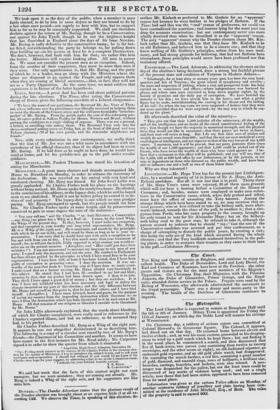DUIsIDEE. — The Dundee Advertiser states that the glorious result of the
Dundee election was brought about at an expense little if at all ex- ceeding 1501. We observe the Times, in speaking of this election, de- scribes Mr. Kinloeh as preferred to MT. Guthrie for no "apparent" reason but because he went farther in his pledges of Reform. If the Times had said this was the "real" reason of preference, we could not have contradicted the.assertion ; real-reasons lying for the most part too deep for accurate examination : but, our contemporary never was more wholly deceived than when he described it as the apparent" reason. The only "apparent" reason why the Dundee electors chose Mr. Kin.. loch rather than Mr.. Guthrie, was that they knew Mr. Kinloch to be an old Reformer, and believed him to be a sincere one ; and that they knew nothing of Mr. Guthrie's principles, unless from his own testi- mony, and had strong grounds for believing, that had not Reform been triumphant, those principles would never have been professed nor that testimony offered.
EDINBURGH.—The Lord Advocate, in addressing the electors on the day of the election's being declared, drew a strong but faithful picture of the present state and condition of Toryism in Modern.Athens- " Edinburgh, for at least sixty or seventy years past, has been the very head- quarters and den of Toryism ; the great school of sycophancy and servility ; the mart and emporium of jobbing, where a vast and prosperous trade has been carried on in consciences and offices--where independence was bartered for places, and where men were recruited to keep down Popular rights, by the bounty of promises and the daily pay of corruption. We have bearded the monster in his den ; we have struck him to the heart; and what a pitiful figure has he made notwithstanding the roaring in his throat and the lashing of his tail ! for when the tug came we were surprised—I believe that they were not more mortified than we were surprised—by the easy way in which he ren-
dered up the ghost." • He afterwards described the value of the minority-
" They give out that their 1,500 includes all the aristocracy, all the wealth, and all the intelligence, and no doubt all the sound constitutional feeling of the city; that though we have the majority in numerical strength, and the physical force they would not like to encounter—that their purses are twice as heavy, and their rent-roll twice as long. But I do say that their men of station and wealth do not exceed more than 600 ; and that the rest are mere menials of a very small degree of intelligence, and not superior to that of the very lowest of our 4,000 voters. I maintain, and it will be proved, . that our party possesses three times the wealth of our 1,500 opponenta ; Mid that 1,500 could be picked out Of our friends, who have twice the wealth of those who have voted against us. I be- lieve that a statement to this effect will be published; and you Will :see, that of the 1,500, 500 or 600 held office by our forbearance, or by life patents, Or are sons or dependents on those who fattened on the public wealth,. and have been able to influence one and a half or two of those below them."
Why are they tolerated?
LixerTnnow.—Mr. Hope Vere has for the present lost Linlithgow- shire, by a nominal majority of 14 in favour of Sir A. Hope, the Anti- Reform candidate. But all is not lost that is in peril. Thirty-three of Mr. Hope Vere's votes, were rejected, 28 of them upon grounds which will not bear a hearing before a Committee of the House of Commons ; and, besides, means were employed to make men volun- teers in the Conservative cause, which, when duly probed and sifted, must have the effect of unseating the -Tory baronet. Among the strange things which have been stated to us, we may mention that se- veral persons, who at first refused to take the bribery oath, were after- wards .induced, towards the close of the poll, to swallow it; that a cler- gyman from Perth, who has some property in • the county, brought up his only tenant to vote for Sir Alexander.Elope ;. but on the bribery- oath being read to the poor man, he refused to take it, although the parson seemed to indicate that he should "rap ;" that the. son of the Ccinservirtive candidate was arrested and put into confinement, on a charge of attempting to disturb the public peace, by creating. a riot; this being the only act of the kind which occurred during the whole election;' and that the Tory landlords stationed themselves in the poll- ing places, in order to overawe their tenants.as they came in their tarn to the poll .—Caledonian Mercury.






















 Previous page
Previous page